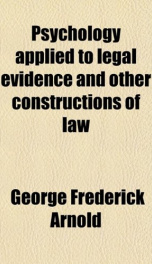psychology applied to legal evidence and other constructions of law

Purchase of this book includes free trial access to www.million-books.com where you can read more than a million books for free. This is an OCR edition with typos. Excerpt from book: CHAPTER III. INTENTION-(Coid.) Sir James Stephen's use of the terms ' will1 am) ' inttntion ' criticisedExamples of Intention in a murder case as presumed under the doctrine discussed in the last chapterExample of the result in a kidnapping case of presuming that a man must intend the legal consequences of his actIntention in estoppelNegligence and intentionmeaning of 'Wilfully'Intention in fraudIntention in cases of mergerUse of motive in lawMotive and IntentionMotive and CauseWill in voluntary confessions Consent Meaning of ' forcing the will 'Criterion of voluntary decision'Intention in the English law of libelVarious meanings of . malice' and resulting confusionIntention in th Indian Law of Defamation'Implied intention,' . express intention ' and ' primary intention'Similar confusion caused by sucli expressions which are in fact reproductions of the doctrine of malice in English law. 1. In his general view of the Criminal Law of England Sir James Stephen has distinguished at some Stephen's uteao? the length certain psychological states, including terms ' will' and yill an(j Intention, in a manner which ' intention. appears to us to call for some remark. We have only space here to quote some of his statements, and must refer the reader for his whole discussion of the subject to chapter III of the above-mentioned woik. "The sensations," he says, ' which accompany every action and distinguish it from a mere occurrence are intention and will. The first step towards an action is, that, to use a common and expressive phrase, it'occurs to the mind.' A mental image more or less definite of the thing to be done is formed by the imagination. The next step is deliberation, whether or not the thing shall be done and this terminates in a menta...
Info about the book
Author:
Series:
Unknown
ISBN:
0314911731
Rating:
3.5/5 (2)Your rating:
0/5
Languge:
English
Users who have this book
Users who want this book
What readers are saying
What do you think? Write your own comment on this book!
write a commentif you like psychology applied to legal evidence and other constructions of law try:
Other books by this author
Do you want to exchange books? It’s EASY!
Get registered and find other users who want to give their favourite books to good hands!

